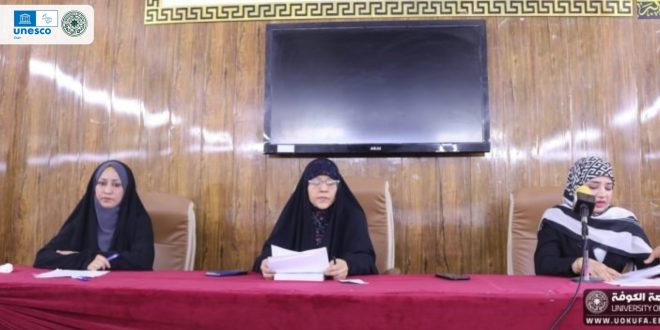In conjunction with International Women’s Day, the UNESCO Chair for Interreligious Dialogue, in collaboration with the Department of Quranic Sciences at the College of Education, held a seminar titled “Women and Current Challenges” in the College of Education hall on Monday, March 11, 2024. The event was attended by the Dean of the College of Education, the Director of the UNESCO Chair, and a group of faculty members and students from the College of Education.
The seminar included three lectures presented by Prof. Dr. Hajar Duwair Hashush, Head of the Department of Quranic Sciences at the College of Education, Assistant Lecturer Zeinab Haidar Nakhilawi, a member of the UNESCO Chair, and Assistant Lecturer Ghufran Kazem Mahmoud from the College of Education.
The seminar shed light on the social and historical reasons that led the United Nations and UNESCO to establish International Women’s Day and provided an introduction to the day’s significance. The speakers discussed the role and significant impact of Iraqi women in society, highlighting their influential presence in social, political, economic, and even national spheres. They also highlighted some prominent Iraqi women who have made notable contributions.
The presentations addressed the challenges women have faced throughout history up to the present day. They also discussed contemporary challenges faced by women in general, and Iraqi women in particular, including human rights violations, social challenges such as the restrictive social view of women’s roles, women’s lack of awareness of their rights, and the difficult security conditions the country has experienced, which have adversely affected women and girls. One of the factors contributing to the decline of women’s roles in Iraqi society is the lack of genuine female representation in the political process and leadership positions in the country. The seminar also explored the social role of contemporary women, their status in society, and the characteristics of independent women who assume leadership roles in scientific and cultural fields, demonstrating their competence and leadership abilities in societal transformations.
At the end of the seminar, the floor was opened for discussion and interventions from the audience, followed by the distribution of certificates of appreciation to the speakers by Dr. Alaa Shatnan, Director of the UNESCO Chair.
 UNESCO CHAIR For Inter-Religious Dialogue Studies in The Islamic World
UNESCO CHAIR For Inter-Religious Dialogue Studies in The Islamic World




